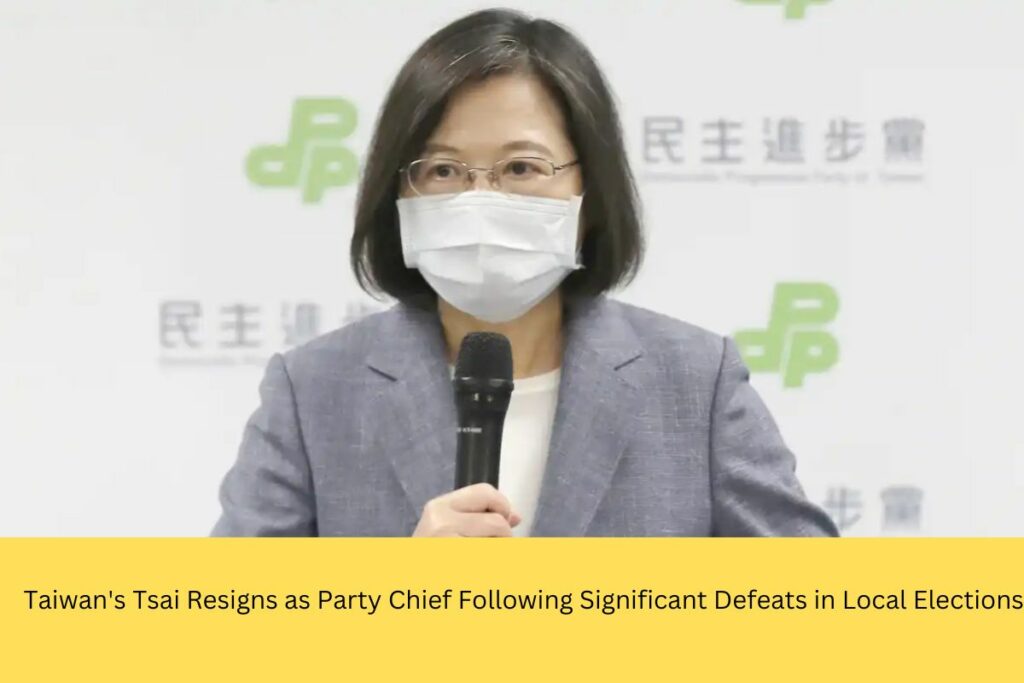After the opposition Kuomintang retook its historic strongholds in the local elections held on Saturday, Taiwanese President Tsai Ing-wen announced her resignation as the head of her party. When her second term ends in early 2024, she will continue to serve as president of Taiwan.
Her Democratic Progressive Party (DPP), which was facing a challenging election season as the party’s term-limited incumbents stepped down, had a bad election night. Su Tseng-chang, the premier, also made a resignation offer, but Tsai rejected it.
“Not what was anticipated were the election results… I should take full responsibility for this, thus I’m stepping down as DPP chairwoman right away “Tsai told reporters. Tsai’s DPP lost all of its support in the northern half of Taiwan, taking only five of the 21 available county and mayoral chief seats, down from seven in the 2018 elections.
Opposition In addition to a string of other triumphs, the Kuomintang (KMT) retook mayoral seats in its traditional metropolitan strongholds of Taipei, Taoyuan, and Keelung. 13 seats in local government were gained by the party, one fewer than before. However, victories in Taipei and Taoyuan, two crucial mayoral elections, overshadowed defeats in the counties of Penghu, Kinmen, and Miaoli.
You May Be Interested In:
- After Being Re-elected, What Will Newsom Do?
- Mastriano, a Trump Supporter, Has Conceded the Governorship of Pennsylvania
Over 82% of the population, or 19.13 million voters, had the opportunity to cast ballots for their favorite candidates in more than 11,000 local government seats. After the DPP acknowledged defeat, Chiang Wan-an, the great-grandson of late KMT leader Chiang Kai-shek, won the election for mayor of the capital.
China claims that Taiwan’s election results demonstrate the desire for peace. Former health minister and DPP candidate Chen Shih-Chung expressed his hope that Chiang’s supporters will send their best wishes. At a post-election rally, he urged his supporters, “I genuinely urge everyone, like me, to join and become a [constructive] force for Taipei, our dear homeland.”
It is not surprising that Chiang won in KMT-leaning Taipei; in fact, it was expected that the opposition would win handily. Last year, Party Chairman Eric Chu committed to resigning if the KMT failed to “win 16 counties and cities, and win more than half of the six municipalities.”
“This is not just the Kuomintang’s win. Most importantly, it is a triumph for Taiwanese citizens, for Taiwan’s democracy, and for all non-green camps “In a statement on television to celebrate the election results, Chu made a reference to the color green, which is typically associated with the DPP and other anti-China groups. Chu urged Tsai to “come back and be [Taiwan’s] president” and accused her of putting her party above the nation.
In advance of the Nov. 25 Taipei mayoral election, Chiang Wan-an of the opposition Kuomintang addresses the crowd. The Reuters. Local patronage networks, individual candidates, and social concerns are what influence local elections in Taiwan the most. Contrast this with presidential and general elections, where national security and China-Taiwan relations are hot topics.
The DPP’s losses in crucial elections as a result of plagiarism accusations benefitted the opposition as well. Lin Chih-Chien received a master’s degree from National Taiwan University in 2017, but the school controversially revoked the degree in August. At the time, Lin was running for mayor of Taoyuan and Hsinchu under the DPP, but he was forced to withdraw.
The scandal was dubbed “one corpse costing five lives” by DPP politician Kao Chia-yu, who meant that the episode badly weakened the party’s efforts in crucial contests, including the two cities, both of which were controlled by the DPP.
The party lost in all five northern cities—Taipei, New Taipei, Keelung, Hsinchu, and Taoyuan—confirming Kao’s predictions. “I am aware that many of my “light blue” acquaintances or those who previously backed the Kuomintang were undecided about their votes this time. Despite their displeasure with Chiang Wan-an, they are unable to back the Democratic Progressive Party “Weng, a 40-year-old voter from Bei Tou, a mountainous region in northern Taipei, spoke after casting her ballot.
Weng, a former political aide to blue-leaning parties and the KMT administration, said that despite the fact that everyone knows Chiang and the party’s use of the second generation of political elites and local grandees in the polls is detrimental to Taiwan’s democracy, the may all support the KMT “with tears” or “with resentment” today.
She claimed to have supported Huang Shan-shan, a candidate for mayor of Taipei who had the support of the party’s head Ko Wen-JE (TPP). Ann Kao of the TPP defeated Mayor Ko’s deputy Huang Shan-shan in the Taipei race, reclaiming the city for the opposition party in Hsinchu.
On November 26, 2022, supporters of the opposition KMT party gather in Taipei, Taiwan, to celebrate the early results of the local elections. The Reuters. With the exception of 2014, when the party was ousted following a significant backlash against KMT President Ma Ying-proposed jealous trade treaty with China, the KMT, which established a stronghold at the local level under decades of strict government, has won every local election this century.
Although Taipei is a KMT stronghold, the victory there is nevertheless significant for the organization. It twice lost the capital to TPP and hasn’t been able to put up a strong challenge to President Tsai Ing-wen in elections or referendums.
The KMT’s 43-year-old Chiang will rise to the top of the field of potential presidential candidates if they successfully retake Taipei. However, observers claim that because of his youth and lack of political experience, Chiang is unlikely to explore a candidacy any time soon.
The proposed constitutional amendment to lower the voting age to 18 was rejected in the meanwhile in referendum. The proposal received 5.65 million votes in favor and 5.02 million votes against it, falling short of the 9.62 million votes required to approve. Taiwan’s voting age is still 20.

